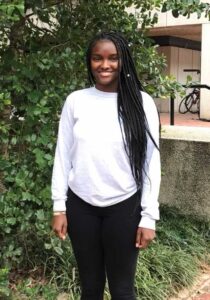Kiara Childs, a Ph.D. student in the Department of Communication, credits The Schrager-York Foundation Summer Research Fellowship with opening up an opportunity for her to research the evolution of Black voices on social media platforms.

Childs received her bachelor’s degree in journalism from the University of Wisconsin with a desire to research media literacy, or how people learn about and assess messages from media.
She said the Summer Research Fellowship gave her the opportunity to focus on her research instead of teaching.
“I’ve been teaching consecutively for three years,” Childs said. “As you can imagine, it’s really hard to do research when you have about 25 students to teach. The Summer Research Fellowship allowed me to really sit with my ideas because I just took my comprehensive exams.” Childs also said she had the time to focus on writing a chapter for her dissertation—a goal that would have been more difficult to achieve while also juggling teaching responsibilities.
Childs said the emergence of social media platforms such as Facebook and Instagram were not necessarily created with Black content producers in mind. She’s examining how Black users of social media platforms are creating cultural narratives of what it means to be Black in America and how white social media influencers sometimes gain social and cultural capital on these platforms without acknowledging the influence of Black women’s digital culture.
“I think it’s really interesting to see how Black women appropriate these technologies for their own needs in ways that the creators didn’t fathom,” Childs said.
Childs said Black beauty blogger culture on social media is often stymied by the platform and that Black women’s voices are often overlooked or shortchanged as they try to transform the standards of beauty culture. She argues that systemic racism also exists on digital platforms.
“Giving Black women the space is really important wherever you are,” Child said. “Giving them the space and actually listening to them and valuing their experiences: That’s really important wherever you are—in the real world or in the virtual world.”
Childs hopes to eventually land a research position at a social media company or pursuing post-doctoral work—both opportunities for which the Summer Research Fellowship will position her well.
“Thanks to the Summer Research Fellowship, I didn’t have to worry about anything else,” Childs said.
The Summer Research Fellowships provide summer support to doctoral students so they may focus exclusively on their dissertation research. The Department of Communication is housed in the College of Arts & Sciences.
